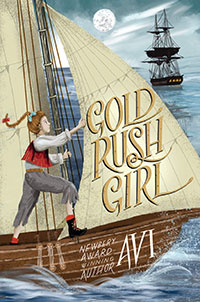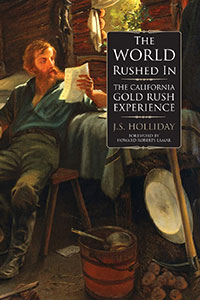 My good friend, the late Betty Miles—who wrote many fine children’s books—once told me: “I have to work on a book for about six months before I feel like a real writer.”
My good friend, the late Betty Miles—who wrote many fine children’s books—once told me: “I have to work on a book for about six months before I feel like a real writer.”
I also recall Thomas Mann, the early twentieth century German writer, saying something to the effect that “The amateur writer finds writing easy. It is the professional writer who finds writing difficult.”
For me, it is always the first draft of a book which proves hard. Thus it was for Gold Rush Girl. I came to the story in backward fashion. That is, when I learned about the abandoned ships—Rotten Row—in San Francisco’s early Gold Rush days, I knew I wanted to write about such an odd thing. But knowing about Rotten Row was not enough. I didn’t have a story, much less characters to bring that story alive. I had the stage set, so to speak, but not a play to put in the stage.
 When I began to do my research, I wasn’t looking for information to give depth to my story as much as I was looking for the story. As it turned out there were stories everywhere. The thousands of people who flocked to California all seemed to have stories to tell. Overwhelmingly male, hard times surely drove some of them to go west. The promise of quick riches drew plenty others. But many came because they wanted adventure, change, and a new life. They were not just working-class people either, but professionals: lawyers, bankers, doctors, and the like. Overall, there were plenty of references to “Gold Fever,” and fever seems to be the right word for many who come. The World Rushed In is the title of just one of the many books about what happened. It’s an accurate phrase. Some, like the Chinese, were going east. Folks from Chili went north. Mexicans, a conquered people, were already there.
When I began to do my research, I wasn’t looking for information to give depth to my story as much as I was looking for the story. As it turned out there were stories everywhere. The thousands of people who flocked to California all seemed to have stories to tell. Overwhelmingly male, hard times surely drove some of them to go west. The promise of quick riches drew plenty others. But many came because they wanted adventure, change, and a new life. They were not just working-class people either, but professionals: lawyers, bankers, doctors, and the like. Overall, there were plenty of references to “Gold Fever,” and fever seems to be the right word for many who come. The World Rushed In is the title of just one of the many books about what happened. It’s an accurate phrase. Some, like the Chinese, were going east. Folks from Chili went north. Mexicans, a conquered people, were already there.
My task, as a writer, was ultimately to reveal why an east coast girl should ever want to go to California, what circumstances would compel her to go to such a wild, untamed place, where feminine company was rare, and then explore what happens to her once she gets there.
In short, I had to become part of Tory’s adventure.
As often happens when I work (if I get lucky), at some point the characters become real, separate from me. Then it seems I just tag along and see what choices they make, and how the adventure unfolds. That’s when—to harken back to Betty’s words—I, ironically, feel like a real writer. “No surprises for the writer, no surprises for the reader,” said Robert Frost. Gold Rush Girl kept surprising me. My expectation is that readers will experience the same surprises.